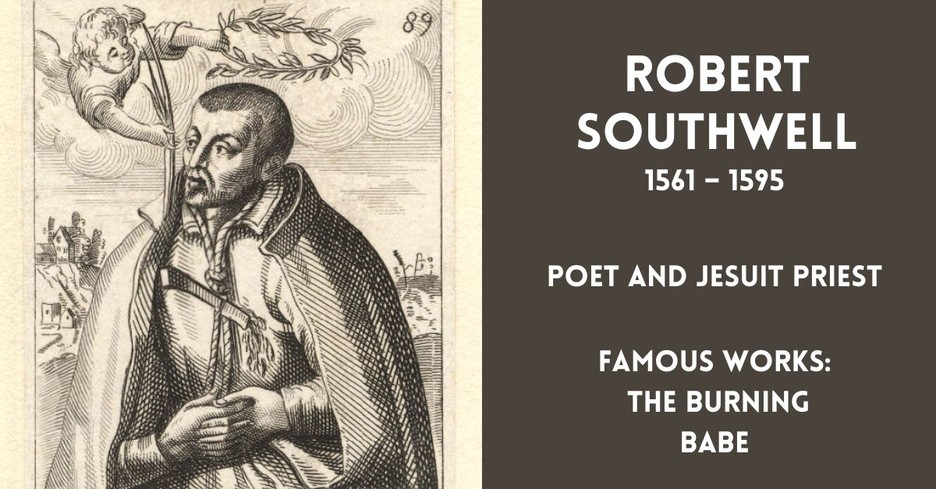
The death of Robert Southwell on this day, February 21, 1595, dramatizes the fact that neither high birth, sincerity, poetic gifts, nor a sweet disposition can protect one from persecution.
Chances are, if you have seen Southwell's name at all, it has been attached to the poem "The Burning Babe" in an English literature anthology. The Christmas Babe is none other than Christ, who says:
My faultless breast the furnace is;
The fuel, wounding thorns;
Love is the fire, and sighs the smoke;
The ashes, shames and scorns;
Shakespeare read Southwell's poems and Ben Jonson said he would gladly destroy many of his own if he might thereby have written Southwell's best.
The creator of "The Burning Babe" was born in England around 1561 to an old Catholic family. His grandfather had been a prominent man in Henry VIII's court and the family remained among the elite of the land. So beautiful was Southwell as a boy that a gypsy stole him. He was soon recovered by his family and grew into a short, handsome man, with gray eyes and red hair.
Even as a child, Southwell distinguished himself by his strong attraction to the old religion. As he grew older, his love for Catholicism remained. Under English Protestantism it was a crime for any Englishman ordained as a Catholic priest to remain in England more than forty days at a time. Southwell flouted this law.
In order to keep English Catholicism alive, William Allen opened a school at Douai, where he made a Catholic translation of the Bible, the well-known Douai version. Southwell attended this school and asked to be admitted into the Jesuit order. At first the Jesuits rejected his application, but eventually his earnest appeals moved them to accept him. He was ordained a priest in 1584. Two years later, at his own request, he went as a missionary to England, well knowing the dangers he faced.
Spies reported Southwell's arrival in England. For six years they kept him under surveillance but did not arrest him. He assumed the alias "Cotton" and found employment as a chaplain to Lady Arundel. During those years, he wrote a prose elegy, Triumphs over Death, to the earl to console him for a sister's premature death. Although he lived mostly in London, he traveled in disguise and preached secretly throughout England.
His downfall and capture came about when Anne Bellamy, a Catholic girl, betrayed him to Richard Topcliffe, a notorious agent of the anti-Catholic persecution.
Southwell was in prison for three years. Tortured thirteen times, he nonetheless refused to reveal the names of fellow Catholics. During his incarceration, he was allowed to write. His works had already circulated widely and seen print, although their authorship was well known and one might have expected the government to suppress them. Now he added poems that were conceived to sustain himself and comfort his fellow prisoners. On this day, February 21, 1595 at Tyburn, Southwell was hanged and quartered for treason, although no treasonous word or act had been shown against him. It was enough that he held a variation of the Christian faith that frightened many Englishmen because of previous Catholic plots.
Bibliography:
- Hood, Christobel M. The Book of Robert Southwell. Oxford: Basil Blackwell, 1926.
- Kunitz, Stanley L. British Authors Before 1800; a biographical dictionary. New York: H. W. Wilson, 1952.
- "Southwell, Robert." Dictionary of National Biography. Edited by Leslie Stephen and Sidney Lee. London: Oxford University Press, 1921-1996.
- Untermeyer, Louis. Lives of the Poets. New York: Simon and Schuster, 1959.
Last updated May, 2007.
Photo Credit: Graphic by G. Connor Salter. Public domain image via Wikimedia Commons.
This article is part of our People of Christianity catalog that features the stories, meaning, and significance of well-known people from the Bible and history. Here are some of the most popular articles for knowing important figures in Christianity:
How Did the Apostle Paul Die?
Who are the Nicolaitans in Revelation?
Who Was Deborah in the Bible?
Who Was Moses in the Bible?
King Solomon's Story in the Bible
Who Was Lot's Wife in the Bible?
Who Was Jezebel in the Bible?
Who Was the Prodigal Son?


